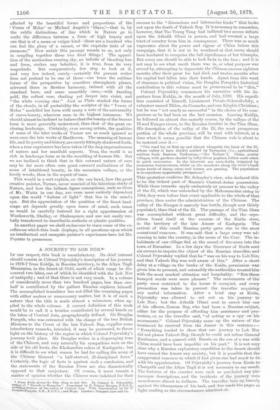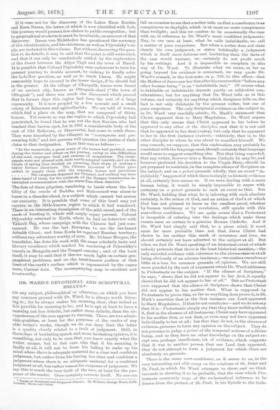A. JOURNEY TO LOB NOR.*'
Le' one respect, this book is unsatisfactory. Its chief interest should consist in Colonel Prjevalsky's description of his journey in 1876.!7-from Kuldja, in Russian territory, to the Allyn Tagh Mountains, in the desert of. Gobi, north of which range he dis- covered two lakes, one of which he identified with the Lob Nor of antiquity ; and of that there is not very much. In a volume of considerably more than two hundred pages, loss than one- half is contributed by the gallant Russian explorer himself. The accomplished translator has not filled the remaining pages with either useless or unnecessary matter, but it is of such a nature that the title is made almost a misnomer, when ap- plied to the whole volume. A correct definition of this work would be to call it a treatise contributed by several hands on the lakes of Central Asia, geographically defined. Sir Douglas Forsyth, who was entrusted with the charge of the two British Missions to the Court of the late Yakoob Bog, supplies some introductory remarks, intended, it may' be presumed, to throw light on-the history of the region in which Colonel Prjevalsky's journey took place. Sir Douglas writes hi a disparaging tone of the Chinese, and very naturally his sympathies wore on the side of his old hosts, the Khokandian rulers of Kashgaria ; but it is difficult to see what reason he had for calling the army of the Chinese General "a half-starved, ill-disciplined force." Certainly, the logic of facts is against such a conclusion, and the statements of the Russian Press are also diametrically opposed to that conjecture. Of course, it must remain a matter of opinion whether the Chinese were indebted for their ' From Kulja Across the Tian Shan in Lob Nor. By Colonel N. Prievalsim atnthor of "Travels in Mongolia.' Translated by E. Delmar Morgan, F.R.G.S., including Notices of the Lakes of Central Asia. With Introduction by Sir T. Douglacrorsyth, 033., ; and ?daps. London Eampson Low and Co.
success to the "dissensions and internecine feuds" that broke out upon the death of Yakoob Beg. It'is necessary to remember, however, that Tao Tsung Tang had inflicted two severe defeats upon the Athalik Ghtizi in person, and had wrested a large tract of country from him in consequence. There was so much vagueness about the power and vigour of China before this campaign, that it is not to be wondered at that many should have hesitated to recognise the full significance other triumphs. But every one should be able to look facts in the face ; and it is not easy to see what merit there was in, or what purpose was seryed by, attempting to depreciate the Chinese success eighteen months after their great foe had died, and twelve months after his capital had fallen into their hands. Apart from this want of clearness in political vision, Sir Douglas Forsyth's historical contribution to this volume must be pronounced to be "thin." Colonel Prjevalsky commences his narrative with his de- parture from Kuldja, in the month of July, 1876. His expedi- tion consisted of himself, Lieutenant Povalo-Schweikofsky, a volunteer named Eklon, six Cossacks, and one Kirghiz Christian; but he was "not nearly as successful" in the choice of his com- panions as he had been on the last occasion. Leaving Kuldja, he followed an almost due easterly course, by the valleys of tho Ili and Kunges rivers, to the Russian frontier in the Tian Sham. His description of the valley of the Iii, the most prosperous portion of the whole province, will be read with interest, at a time when it seems possible that the Chinese rule is about to be restored over it :—
"Our road lay at first up and almost alongside the bank of the whose valley is here thickly settled by Taranehis (i.e., agricultural settlers from Eastern Turkestan,—'the Toilers '). Clean, pretty villages, with gardens shaded by lofty silver poplars, follow each other in quick succession. In the intervals are eorn-delds, irrigated by numerous watercourses, whilst on the meadows along the river's bank large herds of sheep, oxen, and horses are gracing. The population is ■ev ory where apparently prosperous?'
This quotation confirms Mr. Schuyler's view, who declared this to be the richest part of Russia's Central-Asian possessions. While these remarks apply exclusively at present to the valley of the Ili, which was untouched by the Mahommedan rising in 1864, they were before that event applicable to the whole of that province, then under the administration of the Chinese. The valley of the Ranges is scarcely less fertile, though now thinly populated, than that of the Ili. The passage of the Tian Shan was accomplished without great difficulty, and the expe-
dition found itself at the sources of the Kaidu river, in the territory of the late Ameer a Kashgaria. The arrival of this small Russian party gave rise to the most sensational rumours. It was said that a large army was ad-
vancing to take the country, in the name of the Czar. The in- habitants of one village lied at the sound of fire-arms into the town of Karashar. In a few days the Governor of Korlosent six envoys to inquire the object of the Russian traveller, and Colonel Prjevalsky replied that he "was on his way to Lob Nor, and that Yakoob Beg 'was well aware of this." After a short delay at a village on the banks of the Keidu, permission was given him to proceed, and ostensibly the authorities treated hin with the most marked attention and hospitality. "But these honeyed words were mere phrases." The movements of tho party were restricted to the house it occupied, and every precaution was taken to prevent the traveller acquiring any useful information. After a brief stay at Korla,
Prjevalsky was allowed to. set out on his journey to Lob Nor ; but the .A.thalik Ghazi sent to escort him one of his officers, Zaman Beg, who had been a Russian subject,
either for the purpose of affording him assistance and-pro- tection, or, as the traveller said, "of acting as a spy' on his movements." Colonel Prjevalsky sums up the nature of the treatment he received from the Ameer in this sentence :—
"Everything tended to show that our journey to Lob Nor did not please Yakoob Beg, though he could not refuse General Kaufmann, and a quarrel with Russia on the eve of a war with
China would have been impolitic on hie part." It is not very clear why a Russian exploratory expedition to the desert should have caused the Ameer any anxiety, but it is possible that the exaggerated rumours to which it had given rise had much to do with his apprehension. Of Prjevalsky's journey from Korla to Chaagalik and the Allyn Tagh it is not necessary to say much. The features of the country were such as precluded any pic- turesque descriptions, and the incidents of the journey were monotonous almost to dullness. The traveller bore up bravely against the irksomeness of his task, and has made his pages as light reading as the circumstances admitted of. If it were not for the discovery of the Lakes Kara Kuchin a=1 Kara Buren, the latter of which is now identified with Lob, this journey would present few claims to public recognition ; but to geographical students it must be invaluable, on account of that discovery. Baron von Richthefen has questioned the accuracy of this identification, and his strictures, as well as Prjevaluky's re- ply, are included in this volume. But without discussing the ques- tion in its details, it may be said that the point is still undecided, and that it can only be conclusively settled by the exploration of the desert between the Allyn Tagh and the town of Hamil. It is possible that Colonel Prjevalsky may endeavour to turn his '
present journey to double account, by seeking to finally solve the Lob-Nor question, as well as to reach Lhasa. He might reasonably hope to succeed in the lesser design, if he sbisuld. fail in the greater. At the village of Chargalik, traces' were found of an ancient city, known as Ottogush-shari ("the town of Ottogush"), and there was imich else discovered which proved that in former days this region had been the seat of a large community. It is now peopled by a few nomads and a small colony of fishermen and agriculturists. We are told of towns, which find a place on the map, that . are composed of thirty houses. Yet remote as was the region to which Prjevalsky had penetrated, he found that he was not the first Russian who had reached that barren spot, for in 1861 .a eonsiderable body of the sect of Old Believers, or Starovertsi, had come to settle there. They were described by the villagers as "courageous and per- severing folk," and few persons-r11 question the justice of their claim to that designation. Their fate was as 'fellows :— "In the meanwhile, a great many of the horses had perished, some during the winter and others on the Journey, owing to the difficulties of the road, improper food, and' swarms of mosquitoes, =Tilde on themore not pleased with their newly-adopted com3try_, return of spring they decided on retracing their steps, or seeking a bettor fortune elsewhere. The Chinese Governor of Milan gave orders to supply them with the requisite horses and provisions • The emigrants departed for Urumtsi) and nothing has been si,nce heard of them, for the outbreak of. the Dungan insurrection in. terrupted communication with the trans.Tian.Shan districts."
The late of .these pilgrims, wandering , in lands where the , hoe' tility of the creeds of Buddha and Mahommed was about to burst in a thunder-cloud, is a subject which cannot' but arouse our curiosity. It is possible that some of this band may yet survive in the little-known region to which it had wandered. There, is an interesting description of thasvild camel; And of the mode of hunting it, which will amply repay perusal. Colonel Wjevalsky returned to Korla, where he had an interview with Yiikoob Beg, whose campaign with the Chinese had just 'com- mence/ Ho was • the last European to see the fax-famed Athalik Ghazi ; and from Korla he, regained Russian territory, without any adventure worthy of -note. Mr. Delmar Morgan, the translator; has donehis work-with the, same scholarly taste and literary excellence which marked his rendering of Prjevalsky's travels in Mongolia and the.Tangut Country; and of the book
i
itself, it may be said that t throws much light on certain geo- graphical problems, and on the least-known portion of that trantuf -the earth's surface which is . represented' by the vague term., Central Asia. The accompanying map is excellent and trustworthy.































 Previous page
Previous page